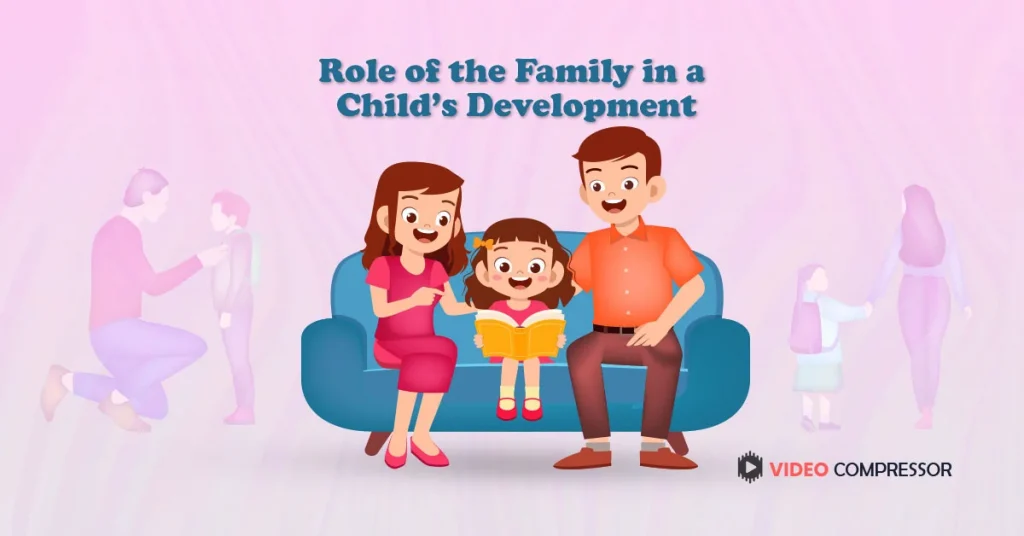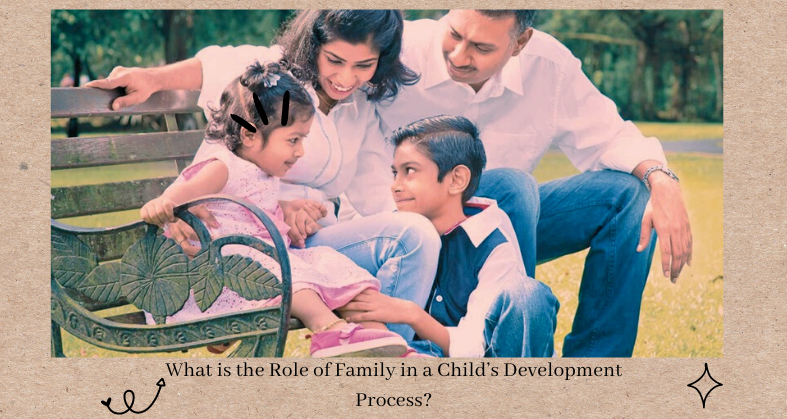What is the Role of Family in a Child’s Development Process?

What is the role of the family? Why is family important to us? Why family is important for us? Home is a child’s first school and family is their first teacher. There is an important role of the family in character development. Humans heavily rely on others to learn and grow as an individual. None of us were born with the knowledge we know now. Humans learn behavior patterns and interacting skills while living in a society and there is the importance of family in society. The environment in which a child grows up plays a huge role in their development process. And for most of us, this learning process begins with family.
What plays important role in the socialization of the child? Learning can be in different forms, for example, some children learn when they are told to do things a certain way. While others absorb what they see around them and start acting like that. The most common way of learning has to be from “observation”. Let me tell you one thing, children see and children do. A child’s first learning space is their family and they pick up values from their home. Ultimately, the family is responsible for a child’s behavior patterns and influencing their skills, values, morals, the role of the family in the socialization of a child, and the child’s security.
Let’s take the example of constructing a building; if you want to construct a strong and large building, the first thing you need to make sure of is creating a solid foundation. If the foundation of your building is done right, the building will remain strong and tall for a long time. But if you mess up the foundation, your building will always find trouble standing tall on its own. People work similarly, if their foundation is not solid from the start, they will find difficulty in managing every relationship in life; be it work, marital, family, health, or themselves. Development in both parents and children has a role in familial influence processes. In other words, the connection between two relatives is a growing one in which each person gradually has an impact on the other. Child development’s impact on bidirectionality was extensively covered by Maccoby (1984).
What is your role in the family? There is also a lot of children’s role in the family. Children’s role in the family is to be loving, obedient, respectful, and Godly
So, we can say that people who interact with a child on a regular basis have the most effect on their development. And in most cases, that is a child’s family. Child and adolescent development
is the process by which a human being grows and matures from birth to maturity. Adolescence has diverse meanings based on the social and cultural situation.
Child Development Theories
Some of the Children’s Developmental theories are below:
- Background
- Freud’s Psychosexual Developmental Theory
- Erikson’s Psychosocial Developmental Theory
- Behavioral Children’s Developmental Theories
- Piaget’s Cognitive Developmental Theory
- Bowlby’s Attachment Theory
- Bandura’s Social Learning Theory
- Vygotsky’s Sociocultural Theory
Child Development Stages – What is Child Development?
The stages of child development involve 4 stages that start from birth to adulthood. These include:
- Physical development: How a child’s body grows and strengthens.
- Social development: How a child learns to interact with others around them.
- Emotional development: When a child begins to understand his/her feelings.
- Cognitive development: When a child begins to think, explore, and figure stuff out on their own.
Discuss the family roles in individual social development stages. With the progression of these stages, a child moves from complete dependency to complete autonomy. You can say that some parts of a child’s development depend upon their genetic makeup. However, according to studies, children adopt what they see around them. Genes alone don’t affect a child’s development; rather the environment they are brought up in plays a huge role too. You can determine a child’s behavior and thinking patterns from the environment they grow. It affects who they become as an adult. There are different Child Development Milestones
Role of family in Child’s Development

Use of Language
Did you know that children adapt to the language and speaking patterns of their environment? Language enables a child to express their needs and communicate with others. Language plays a key role in shaping the child development. But when children gain vocabulary, it puts an impact on them socially, mentally, and emotionally. Language does not only include the words you use but how you use them. Try to speak in a soft tone when interacting with your child. If they ask you inappropriate questions, don’t scold them. Rather try to understand their perspective and educate them on the subject. Make eye contact while interacting with them as this will improve their confidence level. If your child is trying to tell you a story, listen carefully so that they understand the value of attention. Make your child feel heard.
Understanding Values
Values are basically the understanding of wrong and right. A society includes norms and values that a child starts learning from a very young age. Usually, we show more respect to things that matter more to us. When you treat someone with disrespect, your child will learn that they value less. We may forget that they are watching us, but children absorb everything like a sponge.
Every parent tries their best to teach their children values like compassion, love, respect, fairness, and responsibility. In our opinion, the best way to teach your kids such values is through “action”. Children learn the most through observation. They will copy how you treat others, interact with society, celebrate holidays, etc. Sit together with your family and have discussions about healthy and unhealthy values. From a young age, give your child some responsibilities like cleaning the table, putting the dirty dishes on the kitchen slab, and giving up their seats for elders. This way, they will learn about the right values from the start.
Teaching them Skills
What does emotional security mean in my childhood? When a child is born, they immediately start learning different skills. Talking about motor skills, a child learns to sit up, crawl, walk, and run at a very young age. These skills may seem ordinary to adults but for a child, it promotes independency which is the first step of development.
Language skill is a vital component of the role of family members in a Children’s development. The way your child speaks to others says a lot about the language you use at home. The family role is to teach children emotional skills at a young age intentionally or unintentionally. If you have a healthy relationship with your spouse, your child will learn about love, passion, and compromise. Never ignore your child’s problem because that may lead to destructive choices for them in the future.
Interacting with Others
When your child is born, you bring them home. Your family role is to become their social group and their first learning center. The way you interact with your family is going to have a huge impact on your child. If you have a healthy relationship with your family, your child will understand the concept of trust, love, and comfort.
The way a person makes and sustains relationships can be judged by their upbringing as a child. Face-to-face responses are most important when teaching your child how to interact with others. When your child asks you a question, give them your full attention, respond with facial expressions, and use a soft tone of voice. This will heavily affect the way your child socializes and interact with other human beings. Simply asking them how their day went at the dinner table can go a long way!
Providing them Security
Every child needs a primary sense of security from their family. Those little ones rely on their role of family members to provide them with food, shelter, clothing, and other basic needs. Not just physical needs, but emotional needs are also met through a child’s family.
According to studies, children interact more openly when they are at home rather than in public spaces. Take measures to create a safe and healthy home environment for your child where he can express his/her thoughts without fear. Consistency is the key to parenting and it will make your child develop a sense of security. After work, make a schedule to spend time with them. It can include a simple bath, storytime, asking them about their school, etc. Your child will feel heard, loved, and secure, and this will ultimately help in your children’s development. As a parent, interact with your child to develop a sense of trust in them. If they trust you, they will never hesitate to share their thoughts with you. We all express ourselves in different ways, especially young children. Remember that trust develops between children and parents when their basic emotional needs are met.
Effects of Conflicts
No family is perfect and as parents, we all can make mistakes at times. The important thing is that you learn from them and don’t let it affect your family bond. Try not to be harsh with your children. Make sure that you always make amendments before going to bed. This way, your child will learn the importance of forgiveness and develop the ability to handle stressful situations. When fights occur, try to resolve them because this will ultimately affect the development of your child’s personality.
Conclusion
We may miss it, but children never do. They soak up everything like sponges and copy it in the future. You may not notice, but every minute you spend with your little one is teaching him/her something that is going to stay with them forever. And all of it plays a huge role in a child’s that family role in socialization, and mental, physical, and emotional development.
Raising children in this digital age can be extremely difficult, but it’s rewarding when done right. But don’t take too much pressure and remember to enjoy every moment you spend with them. This precious age goes by very fast, so cherish it while you can!
Can you think of any more factors that play a role in a Children’s development? If yes, then let us know your thoughts in the comment section down below!







